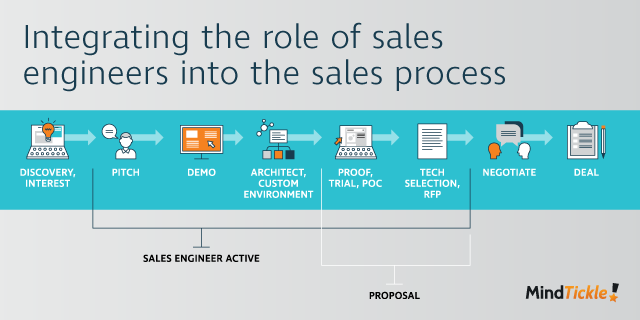Why Its Important to Integrate Sales Engineers into Your Company’s Sales Process
Sales engineers play a crucial role in the sales process for complex products. With their deep technical expertise, they bring to life the value your product adds to customers. But many sales organizations make the mistake of bringing them into the process too early or too late.
When you’re in the discovery stage, customers don’t need an engineer’s level of expertise, they just need to qualify that your product may be right for them. But if you bring them in when a customer has started to question your product features or value, it may be too late for them to change their mind.
So when should you involve a sales engineer?
Sales engineers should be brought into the sales process early enough to add value to your customer. They often do this by helping the customer understand how your product may solve their problem and address their pain points. In the early stages, sales engineers may make suggestions or give a customer new ideas for them to consider. This helps the customer understand what their own requirements are before they start to evaluate specific solutions.
By the time a customer is matching requirements to vendors, the opportunity for your sales engineer to add value has been lost. This is because customers narrow their perspective of what they need as they progress down the sales process. While sales engineers add a lot of value later in the process, they can really help seal the deal early on by helping customers define their requirements. This process can begin before a customer has even seen a demo of your product.
How do you integrate sales engineers into the sales process?
By getting a sales engineer involved in the pitch stage, they can start to understand your customer’s unique needs, what they need and your sales strategy. If they are only brought in at the demo stage, they will be essentially walking into a customer meeting blind – without any context to what has happened before. This is less than optimal for both the sales engineer and your customer.
As sales engineers are involved in many crucial parts of the sales process, from pitch right through to RFP, it’s important to integrate them into the sales process so they, and your reps, always have the information they need. There are four ways to integrate your sales engineers into the process.
1. Tell reps when to get them involved
Your sales process should help your reps understand when they should get a sales engineer involved and how they should be involved. The right moment will depend on your product and how complex it is.
If you’re not sure when or how to get a sales engineer involved, take a look at past success stories that have involved sales engineers. Where and how did they add the most value? This will help you identify where to incorporate engineers into your process.
Once you’ve identified the right time, make sure your sales reps and engineers are trained on this. They should understand why they’re getting a sales engineer involved, the role they play in the sales process and what they can expect. This will give both sales reps and engineers clarity on their roles.
2. Incorporate their tools
Sales engineers use a range of tools to help them work effectively and efficiently. These may include worksheets and selling aids, for example. These tools should not be kept and maintained outside the sales process, but rather integrated into it. This means they should be included in workflows, available centrally so that they’re easily accessible and incorporated into the standard process.
3. Put them in the system
An important part of integrating your sales engineers into the entire sales process is through systems. Your CRM is the heart of your sales stack, so the role of the sales engineer should be incorporated into its workflows. Adding all of their tasks and tools into your CRM workflow will ensure that they know where each customer is in the sales process and are ready to go when your reps need them.
Sales engineers should also use the same enablement or sales readiness software as your reps. This will make sure there are no gaps in their capabilities or the information that both engineers and reps receive. By using the same sales readiness software they can receive the same learning modules, the same quick updates on competitors and product features and the internal communications. This ensures that everyone is on the same page.
4. Connect them to the conversation
There are often many people involved in the sales process and social or collaboration tools are a great way to keep everyone on the same page. Sales engineers should be included in those conversations so they have all the information they need to help your reps close the deal. This is crucial, especially considering that sales engineers often bring in expertise from other parts of the organization. They work closely with the product to understand features and customer success for use cases. By bringing them into collaborative discussions, they can not only add value to the sales strategy but also stay on top of it.
By integrating your sales engineers into your sales process, you can ensure your engineers have all the information they need and are ready whenever your reps need them. This will give each opportunity the best chance of success.



